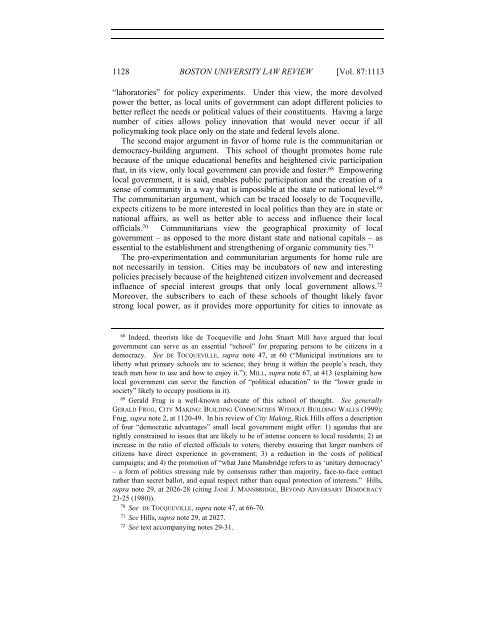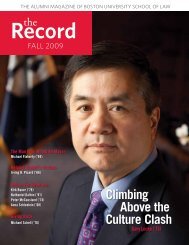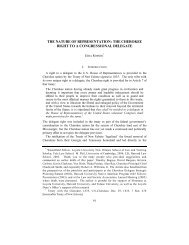INTRASTATE PREEMPTION
INTRASTATE PREEMPTION
INTRASTATE PREEMPTION
- No tags were found...
Create successful ePaper yourself
Turn your PDF publications into a flip-book with our unique Google optimized e-Paper software.
1128 BOSTON UNIVERSITY LAW REVIEW [Vol. 87:1113“laboratories” for policy experiments. Under this view, the more devolvedpower the better, as local units of government can adopt different policies tobetter reflect the needs or political values of their constituents. Having a largenumber of cities allows policy innovation that would never occur if allpolicymaking took place only on the state and federal levels alone.The second major argument in favor of home rule is the communitarian ordemocracy-building argument. This school of thought promotes home rulebecause of the unique educational benefits and heightened civic participationthat, in its view, only local government can provide and foster. 68 Empoweringlocal government, it is said, enables public participation and the creation of asense of community in a way that is impossible at the state or national level. 69The communitarian argument, which can be traced loosely to de Tocqueville,expects citizens to be more interested in local politics than they are in state ornational affairs, as well as better able to access and influence their localofficials. 70 Communitarians view the geographical proximity of localgovernment – as opposed to the more distant state and national capitals – asessential to the establishment and strengthening of organic community ties. 71The pro-experimentation and communitarian arguments for home rule arenot necessarily in tension. Cities may be incubators of new and interestingpolicies precisely because of the heightened citizen involvement and decreasedinfluence of special interest groups that only local government allows. 72Moreover, the subscribers to each of these schools of thought likely favorstrong local power, as it provides more opportunity for cities to innovate as68 Indeed, theorists like de Tocqueville and John Stuart Mill have argued that localgovernment can serve as an essential “school” for preparing persons to be citizens in ademocracy. See DE TOCQUEVILLE, supra note 47, at 60 (“Municipal institutions are toliberty what primary schools are to science; they bring it within the people’s reach, theyteach men how to use and how to enjoy it.”); MILL, supra note 67, at 413 (explaining howlocal government can serve the function of “political education” to the “lower grade insociety” likely to occupy positions in it).69 Gerald Frug is a well-known advocate of this school of thought. See generallyGERALD FRUG, CITY MAKING: BUILDING COMMUNITIES WITHOUT BUILDING WALLS (1999);Frug, supra note 2, at 1120-49. In his review of City Making, Rick Hills offers a descriptionof four “democratic advantages” small local government might offer: 1) agendas that aretightly constrained to issues that are likely to be of intense concern to local residents; 2) anincrease in the ratio of elected officials to voters, thereby ensuring that larger numbers ofcitizens have direct experience in government; 3) a reduction in the costs of politicalcampaigns; and 4) the promotion of “what Jane Mansbridge refers to as ‘unitary democracy’– a form of politics stressing rule by consensus rather than majority, face-to-face contactrather than secret ballot, and equal respect rather than equal protection of interests.” Hills,supra note 29, at 2026-28 (citing JANE J. MANSBRIDGE, BEYOND ADVERSARY DEMOCRACY23-25 (1980)).70 See DE TOCQUEVILLE, supra note 47, at 66-70.71 See Hills, supra note 29, at 2027.72 See text accompanying notes 29-31.









